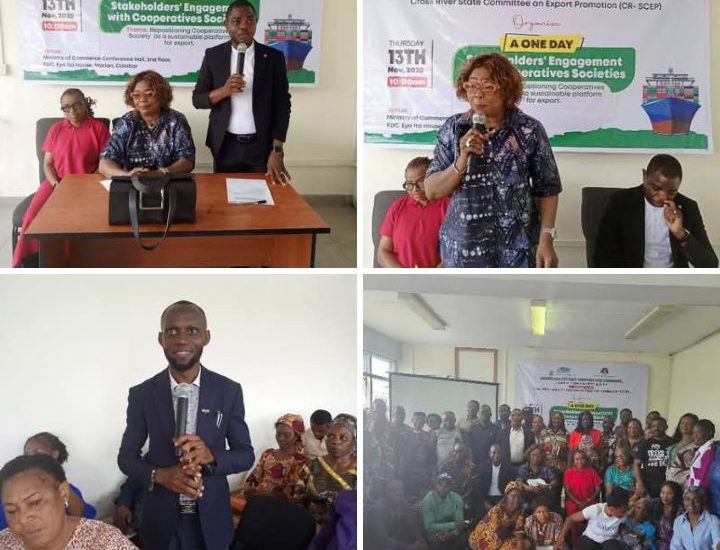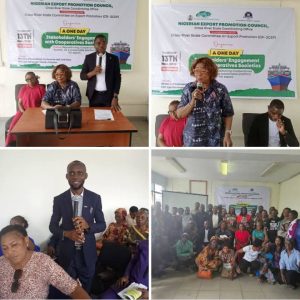COOPERATIVES CRUCIAL FOR EXPORT PROMOTION, SAYS NEPC C’RIVER COORDINATOR
✓ Cross River stakeholders urged to reposition cooperatives as vehicles for sustainable trade and inclusive growth.
By Amawu, Cletus Albert Amawu.
CALABAR — The Cross River State Coordinator of the Nigerian Export Promotion Council (NEPC), Dr. Osas Damian Omorogbe, has underscored the strategic importance of Cooperative Societies as viable instruments for economic inclusion, rural development, and export growth in Nigeria.
Speaking during a one-day Stakeholders’ Engagement with Cooperative Societies, organised in collaboration with the Cross River State Committee on Export Promotion (CR-SCEP), Dr. Omorogbe emphasised that cooperatives play a pivotal role in strengthening local production and preparing smallholders for international markets.
According to him, the NEPC’s focus is on developing people and business entities rather than individuals, noting that “cooperative societies combine both social and economic pillars of development.” He stressed that the Council recognises cooperatives as key stakeholders in its export promotion agenda because they provide platforms for members to pool resources, share knowledge, and improve production capacity.
“Our objective is to build people, develop products, and position cooperatives as export-ready entities,” he said.
Presenting a paper titled “Building Sustainable Export Platforms through Viable Cooperative Societies,” Dr. Omorogbe outlined strategies for strengthening export-oriented cooperatives. He identified sound institutional frameworks, transparent financial systems, and regular capacity development as essential for sustainability and competitiveness.
“A sustainable financial and capital framework forms the backbone of functional cooperatives, encompassing member equity, reserve funds, cooperative credit schemes, and access to grants,” he added, urging societies to prioritise accountability and regular audits.
Representing the Honourable Commissioner for Commerce, Dr (Mrs) Abigail Orok Duke, the Permanent Secretary of the Ministry, Mrs. Philomena Nyiang, in her opening remarks, encouraged participants to embrace the spirit of collaboration, describing cooperatives as powerful engines of community empowerment.
“When we cooperate, we multiply strength and reduce cost. You may not afford a cow alone, but thirty people can buy one together, that’s cooperation,” she said.
She called on members to reorient their mindset towards productivity and practical action rather than dependence on government support.
Mrs. Nyiang further urged participants to think innovatively and explore small business ventures that can grow into sustainable enterprises.
“Start with what you have, rent out canopies, sell ginger, do something. Cooperatives are about acting together to achieve results,” she advised, adding that the government is ready to support credible and active groups with clear operational structures.
Also speaking, Mrs. Esther Obaji, the Cooperative Desk Officer of the Ministry of Social Welfare and Community Development, who represented the State Director of Cooperative Societies, Mrs. Christiana Adinye, commended the engagement as timely and relevant. She noted that it aligns with the Ministry’s mandate to sensitise, educate, monitor, and support the growth of cooperatives in Cross River State.
“This engagement provides the right platform to build capacity and reawaken the cooperative spirit among members,” she said.
The event, held at the Ministry of Commerce Conference Hall, Eyo Ita House, Calabar, was moderated by Mr. Edet Eyo, NEPC Trade Promotion Officer. It brought together Presidents, Secretaries, and representatives of over 30 Cooperative Societies across the state. Participants described the meeting as insightful and reaffirmed their commitment to repositioning their societies for greater economic participation and export readiness.
Action plan issued at the end of the engagement, participants resolved to strengthen inter-cooperative collaboration, enhance record-keeping, and establish an Export-Ready Cooperative Cluster (ERCC) to coordinate joint marketing and capacity-building initiatives. They also pledged to align their activities with NEPC’s export promotion strategies and to support the state government’s drive for inclusive and sustainable economic growth.






